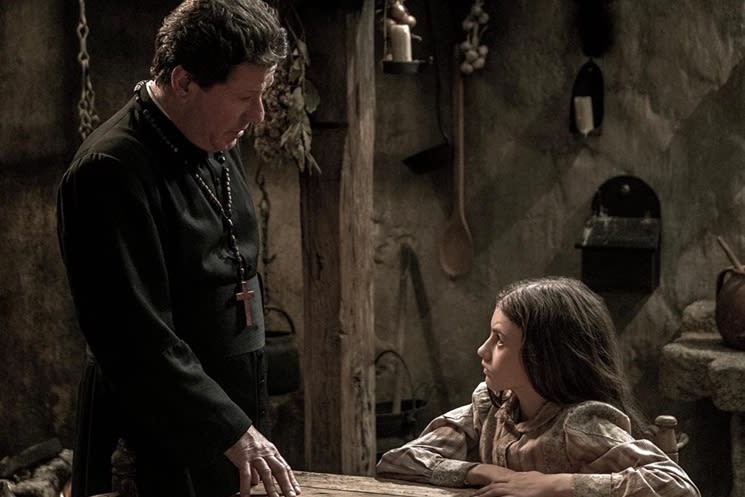The world we're in right now might not be the best to release a film about saints and miracles into, which is what it appears to Fatima is about at first glance. But don't be fooled — Fatima is a film of epic proportions. Part hagiology, part religious critique and part historical account, this movie manages to tell a well-balanced tale that raises important philosophical questions without being bogged down by religious debate or pedantry.
Fatima opens in the 1980s with Professor Nichols (Harvey Keitel, being his inimitable self) interviewing Sister Lucia (played by Sônia Braga) for a book he's working on. Sister Lucia tells the story of how, in 1917, when she was 10 (young Lucia is played by Stephanie Gil), she and her cousins had visions of Mary in their town of Fátima, Portugal. The children soon gather around them, a growing group of people desperate for a miracle in face of the bloodiest war they had ever seen. But they also incur the ire of their parents, who think they're lying, along with skepticism of church officials, who wonder why children were chosen to witness something holy. There is also intense resistance from the town's mayor (Goran Visnjic). Portugal in 1917 was dominated by the idea that religion came in the way of progress, that it held the Portuguese people back. The mayor is worried he will come under fire from Lisbon when the capital receives reports of Lucia having seen the Virgin Mary in Fátima.
In other words, the film details the various forces that Lucia and her cousins come up against as they attempt to fulfill what they believe is heavenly order. It's sympathetic to the pressure the mayor is under, and his conflict with his religious wife. But the most poignant representation is that of the fraught relationship between Lucia and her mother (Lúcia Moniz), who just wants her son back alive. The film balances the religious content with Keitel's character, the dry-witted Professor Nichols, who challenges Sister Lucia's divine claims, and brings in some psychology and critical theory, but isn't condescending to Lucia, who is strong-willed and deeply intelligent — their discussions are interesting and at points funny.
Fatima is an all-round beautiful film about the role that women played in Portugal during WWI, about a young girl and her emotionally unavailable and potentially negligent mother, and a town in desperate need of something to hold on to in order to survive. The music will move you to tears, the cinematography is stunning, and the acting is spot-on. Gil is a wonder to behold as young Lucia running through Fátima, her enigmatic pull holding the film together, giving order to all the narratives.
Though Fatima might not prompt religious conversion, it is a compelling story of the importance of holding onto hope — how terribly we need it to survive this world. It is a masterclass on how to braid so many complex and nuanced stories together to form a cohesive whole. But ultimately, it's an exciting tale of the power of a young girl.
(Elevation Pictures)Fatima opens in the 1980s with Professor Nichols (Harvey Keitel, being his inimitable self) interviewing Sister Lucia (played by Sônia Braga) for a book he's working on. Sister Lucia tells the story of how, in 1917, when she was 10 (young Lucia is played by Stephanie Gil), she and her cousins had visions of Mary in their town of Fátima, Portugal. The children soon gather around them, a growing group of people desperate for a miracle in face of the bloodiest war they had ever seen. But they also incur the ire of their parents, who think they're lying, along with skepticism of church officials, who wonder why children were chosen to witness something holy. There is also intense resistance from the town's mayor (Goran Visnjic). Portugal in 1917 was dominated by the idea that religion came in the way of progress, that it held the Portuguese people back. The mayor is worried he will come under fire from Lisbon when the capital receives reports of Lucia having seen the Virgin Mary in Fátima.
In other words, the film details the various forces that Lucia and her cousins come up against as they attempt to fulfill what they believe is heavenly order. It's sympathetic to the pressure the mayor is under, and his conflict with his religious wife. But the most poignant representation is that of the fraught relationship between Lucia and her mother (Lúcia Moniz), who just wants her son back alive. The film balances the religious content with Keitel's character, the dry-witted Professor Nichols, who challenges Sister Lucia's divine claims, and brings in some psychology and critical theory, but isn't condescending to Lucia, who is strong-willed and deeply intelligent — their discussions are interesting and at points funny.
Fatima is an all-round beautiful film about the role that women played in Portugal during WWI, about a young girl and her emotionally unavailable and potentially negligent mother, and a town in desperate need of something to hold on to in order to survive. The music will move you to tears, the cinematography is stunning, and the acting is spot-on. Gil is a wonder to behold as young Lucia running through Fátima, her enigmatic pull holding the film together, giving order to all the narratives.
Though Fatima might not prompt religious conversion, it is a compelling story of the importance of holding onto hope — how terribly we need it to survive this world. It is a masterclass on how to braid so many complex and nuanced stories together to form a cohesive whole. But ultimately, it's an exciting tale of the power of a young girl.
